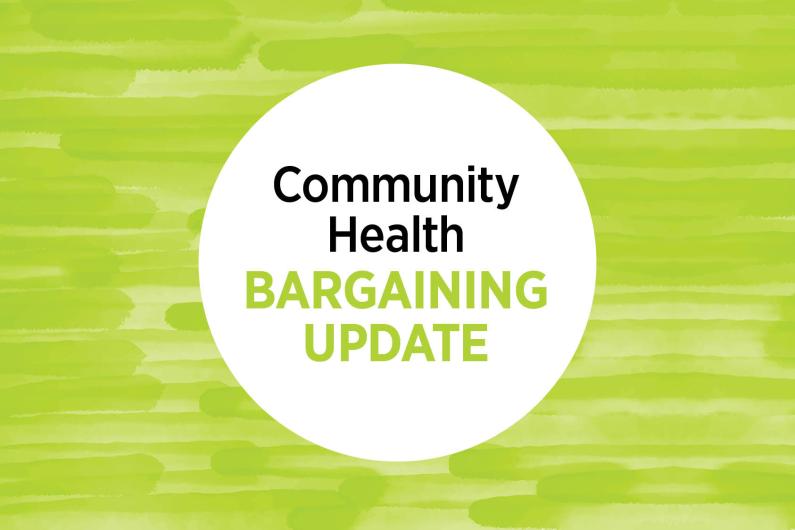More than 30 HEU members in the community health subsector gathered at the union’s Provincial Office in Burnaby for a two-day bargaining conference to prepare for the next round of contract negotiations.
Delegates – covered by the Community Bargaining Association (CBA) contract – debated and voted on bargaining demands submitted by HEU locals, the union’s equity standing committees and the Provincial Executive, and also elected a new bargaining committee.
During the conference, delegates reviewed the results of a pre-bargaining membership survey and learned about the history of community health bargaining.
They also heard from several guest speakers.

In her bargaining address, HEU secretary-business manager Lynn Bueckert spoke about the intricate nature of community health jobs and the importance of building on the low-wage redress and significant wage increases from the last round of bargaining that are moving CBA pay rates closer to those in the facilities subsector.
“You serve so many British Columbians,” said Bueckert. “Seniors in their homes; individuals struggling with mental health and substance-use issues; the homeless, and many others who rely on the caring, compassionate support our community health members provide.
“It is caring work – working with the most vulnerable whose needs are misunderstood and often sidelined. And it’s work largely done by women workers, seen as an extension of work ‘at home’, and consequently, it is undervalued and underpaid.”
HEU represents more than 2,300 members covered by the multi-union CBA collective agreement, led by the BCGEU at the bargaining table.
Solidarity greetings were delivered by BCGEU community health vice-president Scott De Long, and BCGEU director of negotiations and CBA spokesperson Richard Tones.
“I fundamentally believe that one of the reasons we were so successful not only as a bargaining association, but also as a movement during the last round of bargaining, wasn’t just because there was somebody willing to listen to us and willing to actually raise wages on the other side of the table, it’s because every union in our bargaining association was prepared last time,” said Tones.
“We had done the work, and they knew it. They knew there was no getting away from those tables without actually addressing the issues that we have. So, being prepared and making sure they know we are prepared is the number one way to make those same paradigm shifts.”
Workplace challenges and bargaining priorities
During open-floor discussions, some delegates spoke about the challenges of working for decades without a pension plan, while others talked about dangerous work environments, inferior health and welfare benefits, and low wages.
Delegates set their top five bargaining priorities under themes: wages, premiums and allowances; parity with the facilities subsector (wages/benefits/pension); safety at work, including improvements to psychological supports and crisis counselling; safer staffing levels and workload; and more paid leaves.
President Barb Nederpel thanked delegates for stepping up as leaders to represent the issues and needs of HEU’s community health members.
“Conferences like this help us to more clearly understand the challenges you experience firsthand in the community health subsector – challenges that are your lived experience,” said Nederpel.
“And through bargaining, it’s where activists – like you – can make a concrete difference. It’s where we can enshrine contract language to improve your work-life balance; provide more tools and resources to improve patient, resident and client care and services; and where we can improve compensation and benefits to better reflect the value of your work.”

Delegates also elected a new bargaining committee: Nicole Russell and Lisa Bouma, with alternates Che Baines, Donna Zmaeff, Krista Zdrill and Tanya Miao.
In her closing remarks, HEU financial secretary Betty Valenzuela told delegates, “Bargaining is part of the foundation of a union’s democracy, and it’s something the labour movement holds sacred. But we cannot do it alone. We need the support of other unions – especially in the way health care bargains as part of multi-union Associations.
‘We need the support of the public who rely on the care and services HEU members deliver. We need the support of decision-makers like politicians, and influencers like the media. Thank goodness the BC NDP got re-elected or we’d be having a different conversation. And we need the support of each other – all HEU members – no matter what sector or subsector you belong to. We are in this together, and stronger together.”
The community health collective agreement expires on March 31, 2025.
